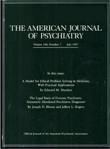Long-term effects of extreme situational stress on sleep and dreaming
Abstract
Sleep data were obtained on 11 patients who had survived traumatic events and who complained of sleep disturbances. Each was awakened from REM and non-REM sleep for dream recall. The patients had lower sleep efficiency indices (because of prolonged sleep latency and larger amounts of "awake" plus "movement" time within sleep periods), shorter REM time, and longer REM latencies than did control subjects. Four of the 11 patients had REM- and non-REM-related nightmares, which, in two sea disaster patients, were associated with REM-related motor activity. The rest of the patients had unusually low dream recall in spite of high eye movement density.
Access content
To read the fulltext, please use one of the options below to sign in or purchase access.- Personal login
- Institutional Login
- Sign in via OpenAthens
- Register for access
-
Please login/register if you wish to pair your device and check access availability.
Not a subscriber?
PsychiatryOnline subscription options offer access to the DSM-5 library, books, journals, CME, and patient resources. This all-in-one virtual library provides psychiatrists and mental health professionals with key resources for diagnosis, treatment, research, and professional development.
Need more help? PsychiatryOnline Customer Service may be reached by emailing [email protected] or by calling 800-368-5777 (in the U.S.) or 703-907-7322 (outside the U.S.).



